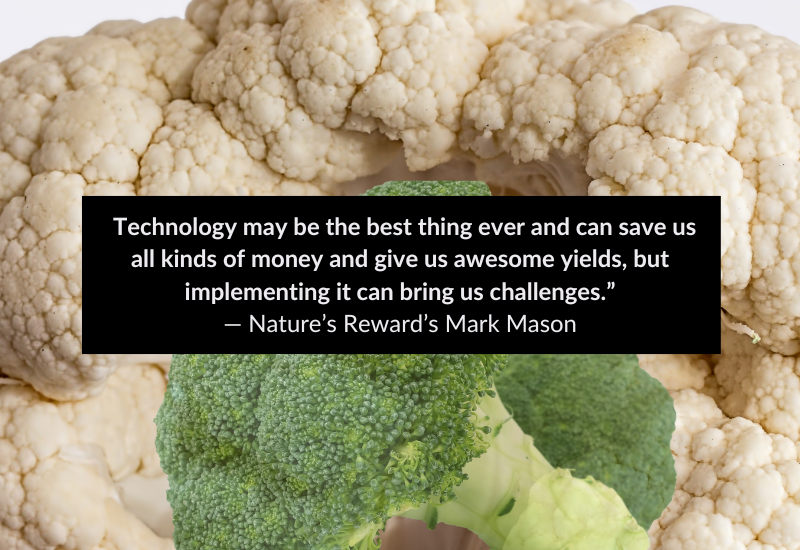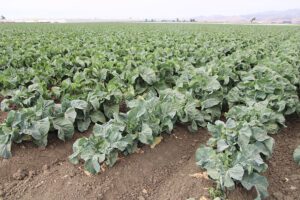
Jun 4, 2024Nature’s Reward battles disease, pests through mechanization, biologicals
Controlling insects and weeds that spread viruses and can devastate crops is a big challenge for Nature’s Reward.
Formerly known as Steinbeck Country Produce, the Huntington family’s longtime growing operation employs biological products to protect its strawberries, lettuce and leafy greens, broccoli, cauliflower and other vegetables.
A multigenerational family farming operation whose Salinas Valley roots trace to the late 1940s, Nature’s Reward is one of the region’s few remaining family-run agricultural businesses.

In 1948, Lou Huntington Sr., began farming tomatoes, potatoes, sugar beets and onions in Soledad, California. After graduating from California Polytechnic University with a degree in ag business, Lou Jr. joined in 1963. Lou Jr.’s sons are very involved: Chris is CEO and Nick is president of farming operations.
The first member of the Huntington family’s fourth generation, Laura (Huntington) Wiegand is an accounting analyst and project manager who focuses on production and harvesting. She specializes in implementing new technology.
In 2019, Nature’s Reward became Steinbeck’s marketing identity.
Pythium wilt, fusarium wilt, verticillium wilt and impatiens necrotic spot virus (INSV) are substantial threats to lettuce. INSV is a destructive plant disease spread by western flower thrips, a pest and virus vector that damages a variety of crops, that has destroyed Salinas Valley lettuce since 2020.
Biologicals pioneer
Mark Mason, farm manager, is participating in the Platform10 (see page 10) field trials. Platform10, an offshoot of the Salinas Biological Summit, is designed to accelerate development and testing of biopesticides and biofungicides. The Huntington Farm trials are focused on INSV and the thrips in lettuce production.
To control disease transmission by thrips, growers try to remove as many weeds as possible when lettuce production shifts from the area during winter. Using chemicals, even if available, cannot adequately cover all the weeds that inhabit the valley’s numerous “reservoirs of virus” in the edges of fields, ditches and railroad tracks, Mason said.
“This is not something we can spray our way out of,” Mason said. “Attacking the weeds seems to be the best way (to control INSV).”

A broccoli field may look well from behind a windshield, but drivers may miss all the weeds hiding under plant canopies. To ensure fields are virus free, growers are examining plants they’ve never really worried about before.
“We as an industry have always been good at keeping weeds out of the fields because they compete with the crops for water and nutrients,” Mason said. “Now, we’re even more aware and that could be with hand crews that go in or with mechanization.”
Platform10 field trials are also testing products on tomatoes, strawberries, grapes and citrus in California.
Pesticide limits
“There’s a push for California ag in general to use less pesticides,” Mason said. “There are a lot of biologicals that need to get screened and gone through. Hopefully, with that platform, we can try to weed out some of the ones that may not be effective.”
As synthetic products become ineffective because of pests developing resistance or are removed from the market by regulators, Mason said he wants to be ahead of the curve with experience using biological products.
Slow reactions may be the most challenging part of biocontrols. Growers may say they don’t work and prematurely give up on them, “so we’re going to have to be patient,” Mason said. “We’ve got to learn how to use them. It’s going to be a big learning curve.”
Nature’s Reward works to dry farm as much as possible with drip tape, which can help prevent overwatering and water collecting at field edges.
“It’s getting distribution of your water,” Mason said, “so you don’t overwater. Maybe farm with a little less water, but it’s hard, especially when you have heat waves coming.
“If your tape doesn’t fit the length of your field, then you have to overwater certain areas to compensate for areas that are dry.”
Since 2014, Mason has used the CropManage system, initially for nitrogen fertilization. Since 2020, he’s used the app to monitor water flow and pressure.
Soil focus
Reaping the benefits of healthier soil, Nature’s Reward plants cover crops. Rotation can help prevent diseases. Carrots have proven to be a successful rotation crop following broccoli, cauliflower and celery. Nature’s Reward added carrots a decade ago and has been increasing acreage.
The company’s one-to-one policy requires a non-lettuce crop to follow first-crop lettuce plantings. Because lettuce is king in the Salinas Valley, such rotations can be difficult to work into the company’s farming system, Mason said.
To ensure healthy soil, Nature’s Reward created a new staff position dedicated to pulling soil samples and conducting nitrogen tests, analyzed in an in-house lab. The samples reveal missing nutrients and are run through CropManage for recommendations. The service has helped Nature’s Reward reduce its nitrogen units by 30%, Mason said.

Universities, USDA researchers and seed companies are working to develop varieties with beneficial genetics.
“Genetics will be the key for pest management in California crops,” Mason said. “What’s important is to get varieties that have disease tolerance or resistance. If you can give me a variety that doesn’t get fusarium, verticillium, pythium and INSV, we are willing to pay for them as growers.”
Nature’s Reward employs automation and drones to help battle weeds and insects. Since 2020, the company has applied sprays via drones and recently ordered drones with larger capacity tanks.
It is close to implementing automated weeding technology that uses a set of knives to remove unwanted plants. The company has also trialed Carbon Robotics’ LaserWeeder.
While Mason said he would like to use one in the field, the machinery appears to work better with high- density organic spinach and cilantro versus conventional crops.
“It’s great technology and is the future of weed control,” Mason said.
Driverless tractors are also the future, especially with spray booms. Mason envisions spray applications leading the new tech to be incorporated on lettuce ranches.
As change can be difficult for teams of workers and staff, it’s been difficult for Nature’s Reward to adopt technology, he said.
“Technology may be the best thing ever and can save us all kinds of money and give us awesome yields, but implementing it can bring us challenges,” Mason said. “There are a lot of people and moving parts involved in implementation.
“We have a system that works,” he said. “We try to make some little changes. We don’t want to disrupt the apple cart.”
Mason recommends growers network with others.
“I always tell people working for me to hang around people smarter than they are,” he said. “We have a great network of people in the Salinas Valley, people from the USDA, Extension, California Leafy Greens Council and grower-shippers.”
















